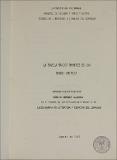| dc.contributor.author | Jiménez Calderón, Rodrigo | |
| dc.date.accessioned | 2020-11-11T00:04:09Z | |
| dc.date.available | 2020-11-11T00:04:09Z | |
| dc.date.issued | 1976 | |
| dc.identifier.other | 000094174 | |
| dc.identifier.uri | http://hdl.handle.net/11056/18623 | |
| dc.description.abstract | El presente trabajo de investigación sobre la novela "Marcos Ramirez", del escritor costarricense Carlos Luis Fallas, fue generado por dos aspectos fundamentales: a. La aplicación, hasta donde fuera posible de un método que facilite para el conocimiento objetivo de la obra literaria, y su trascendencia dentro del contexto social que lo origina. Ver la literatura desde una concepción totalizadora. b. La literatura analítica de la obra plantea varias interrogantes para las cuales consideramos necesario buscar una respuesta a través de
la investigación. Ellas especialmente son: a. ¿Por qué se escogió a Marcos Ramírez como un personaje rebelde? b. ¿Por qué se le da gran importancia a la educación dentro del mundo mostrado ? c. ¿Qué se pretende con la constante lucha individual en contra del código social ?. Después de realizada la lectura analítica de la obra la presente, actual investigación pretende demostrar que detrás de la plurisignificación de la obra y sus diversos significativos subyace una ley estructural, una ley de sentido que la explica. Ley estructural que nos planteamos como hipótesis, la cual es: "La violación del código social por parte del protagonista conlleva a una degradación individual, ya que este no solo cuestiona el código social, sino que lucha por encontrar valores que puedan darle sentido, al no encontrarlos se convierte en un héroe degradado, que para salir finalmente de esa degradación decide amprender la aventura en búsqueda de nuevos valores y resolución de su conflicto. Esta hipótesis genera otra subyacente: "El protagonista es un elemento estructural utilizado para crear una imagen ideológica crítica". | es_ES |
| dc.description.abstract | This research work on the novel "Marcos Ramirez", by the Costa Rican writer Carlos Luis Fallas, was generated by two fundamental aspects: a. The application, as far as possible, of a method that facilitates the objective knowledge of the literary work, and its significance within the social context that originates it. See literature from a totalizing conception. second. The analytical literature of the work raises several questions for which we consider it necessary to seek an answer through the investigation. They especially son: a. Why was Marcos Ramírez chosen as a rebellious character? second. Why is education given great importance within the world shown? C. What is intended with the constant individual struggle against the social code? After the analytical reading of the present work has been carried out, current research aims to demonstrate that behind the multiple meaning of the work and its various meanings lies a structural law, a law of meaning that explains it. Structural law that we propose as a hypothesis, which is: "The violation of the social code by the protagonist entails individual degradation, since he not only questions the social code, but also struggles to find values that can give it meaning, by not finding them becomes a degraded hero, who to finally get out of that degradation decides to undertake the adventure in search of new values and resolution of his conflict. This hypothesis generates another underlying one: "The protagonist is a structural element used to create a critical ideological image". | es_ES |
| dc.description.sponsorship | Universidad Nacional, Costa Rica | es_ES |
| dc.language.iso | spa | es_ES |
| dc.publisher | Universidad Nacional, Costa Rica | es_ES |
| dc.rights | Acceso abierto | es_ES |
| dc.rights | Attribution-NonCommercial-NoDerivatives 4.0 Internacional | * |
| dc.rights.uri | http://creativecommons.org/licenses/by-nc-nd/4.0/ | * |
| dc.subject | CRITICA LITERARIA | es_ES |
| dc.subject | ESCRITORES COSTARRICENSES | es_ES |
| dc.subject | LITERARY CRITICISM | es_ES |
| dc.subject | COSTA RICAN WRITERS | es_ES |
| dc.title | La novela Marcos Ramírez es una imagen crítica | es_ES |
| dc.type | http://purl.org/coar/resource_type/c_7a1f | es_ES |
| una.tesis.numero | 0586 | es_ES |
| dc.description.procedence | Escuela de Literatura y Ciencias del Lenguaje | es_ES |


